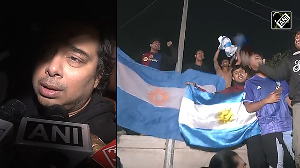Iranian envoy Kamal Kharrazi's trip -- two days after Secretary of State Condoleezza Rice paid a surprise visit to support the war-ravaged country's political process -- was the highest-level visit by an official from any of Iraq's six neighboring countries since Saddam Hussein's ouster two years ago.
Kharrazi, who held talks with Iraqi Prime Minister Ibrahim al-Jaafari, President Jalal Talabani and Foreign Minister Hoshyar Zebari on a day of deepening sectarian violence, vowed that his country was committed to supporting Iraq's political and economic reconstruction and would do all it could to improve security conditions.
"We believe securing the borders between the two countries means security to the Islamic Republic of Iran," Kharrazi said.
Zebari said militants have infiltrated from Iran into Iraq "but we are not saying that they are approved by the Iranian government."
New British Defense Secretary John Reid also visited Iraq on Tuesday, traveling to Baghdad and Basra on his first foreign trip.
The stream of visitors is aimed at shoring up the new Iraqi leadership caught in a surge of violence that has killed more than 470 people killed since the government was announced April 28.
Ties between neighboring Iraq and Iran improved after the ouster of Saddam, who led an eight-year war against Iran during the 1980s in which more than 1 million people died.
Relations remained cool after that war, with Iran supporting anti-Saddam groups and the former Iraqi leader hosting the Mujahedeen Khalq, an Iranian militia that fought the Shia religious regime in Tehran.
But since the US-led invasion swept Saddam from power, Iraq's majority Shiite Muslim community has risen to power and worked to build close ties with Iran.
Iran, however, has been accused of supporting insurgents in Iraq to destabilize reconstruction efforts by the United States, which regards Tehran as a terror sponsor bent on producing nuclear weapons.
Iran denies both claims. Al-Jaafari, who led anti-Saddam militiamen based in Iran during part of his two-decade exile, has said Iraq now wants positive relations with Iran.
The Iranian envoy's visit comes at a time of spiraling violence fueled by foreign extremists and rival groups of Sunnis and Shiites.
US troops backed by helicopters battled scores of insurgents holed up in two houses in Mosul, 225 miles northwest of Baghdad.
Mosul police commander Lt. Gen. Ahmad Mohammed Khalaf claimed 20 militants were killed when US aircraft destroyed the buildings, but the American military said it was unaware of any casualties.
Three Islamic clerics --a Shiite and two Sunnis were shot and killed in Baghdad, police said Tuesday, a day after Iraq's prime minister vowed to use an "iron fist" to end sectarian violence.
Another 17 Iraqis were killed Tuesday: two Iraqi officials in separate Baghdad drive-by shootings, six truck drivers delivering supplies to US forces north of the capital, a former member of Saddam's Baath Party and his three grown sons, three Mosul police officers and two soldiers in Baghdad.





